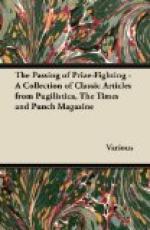The Solemn G. Now what I want to see, my dear, is the ork—ork—angel that RUSKIN thinks TINTORETTO painted the day after he saw a rook—kic—kic—kic—kingfisher.
[BOB nudges PODBURY, who resists temptation heroically.
Miss P. (reading).... “the fig-tree which, by a curious caprice, has golden ribs to all its leaves.”—Do you see the ribs, Mr. PODBURY.
Podb. (feebly). Y—yes. I believe I do. Think they grew that sort of fig-tree formerly, or is it—a—allegorical?
Miss P. (receiving this query in crushing silence). The ceiling requires careful study. Look at that oblong panel in the centre—with the fiery serpents, which RUSKIN finely compares to “winged lampreys.” You’re not looking in the right way to see them, Mr. PODBURY!
Podb. (faintly). I—I did see them—all of them, on my honour I did! But it gives me such a crick in my neck!
Miss P. Surely TINTORET is worth a crick in the neck. Did you observe “the intense delight in biting expressed in their eyes?”
Bob. (frivolously). I did, ’PATIA—exactly the same look I observed last night, in a mosquito’s eye.
[PODBURY has to use his handkerchief violently.
The Stout Lady. Now, ETHEL, we can just spend ten minutes on the ceiling—and then we must go. That’s evidently JONAH in the small oval. (Referring to plan.) Yes, I thought so,—it is JONAH. RUSKIN considers “the whale’s tongue much too large, unless it is a kind of crimson cushion for JONAH to kneel upon.” Well, why not?
Ethel. A cushion, Mother? what, inside the whale!
The Stout Lady. That we are not told, my love—“The submissiveness of Jonah is well given”—So true—but Papa can’t bear being kept waiting for his lunch—we really ought to go now. [They go.
The Solemn G. (reading). “There comes up out of the mist a dark hand.” Have you got the dark hand yet, my dear?
His Wife. No, dear, only the mist. At least, there’s something that may be a branch; or a bird of some sort.
The S.G. Ha, it’s full of suggestion—full of suggestion!
[He passes on, coughing.
Miss P. (to PODBURY, who is still quivering). Now notice the end one—“the Fall of Manna”—not that end; that’s “the Fall of Man.” RUSKIN points out (reading)—“A very sweet incident. Four or five sheep, instead of pasturing, turn their heads to catch the manna as it comes down” (here BOB catches PODBURY’s eye) “or seem to be licking it off each other’s fleeces.” (PODBURY is suddenly convulsed by inexplicable and untimely mirth.) Really, Mr. PODBURY, this is too disgraceful! [She shuts the book sharply and walks away.




